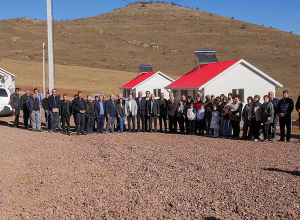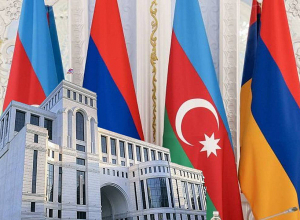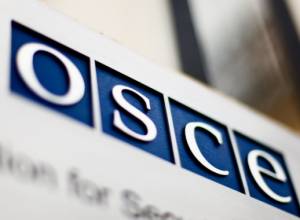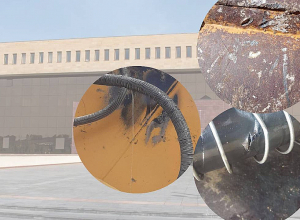Trap for journalists: secret change (video)
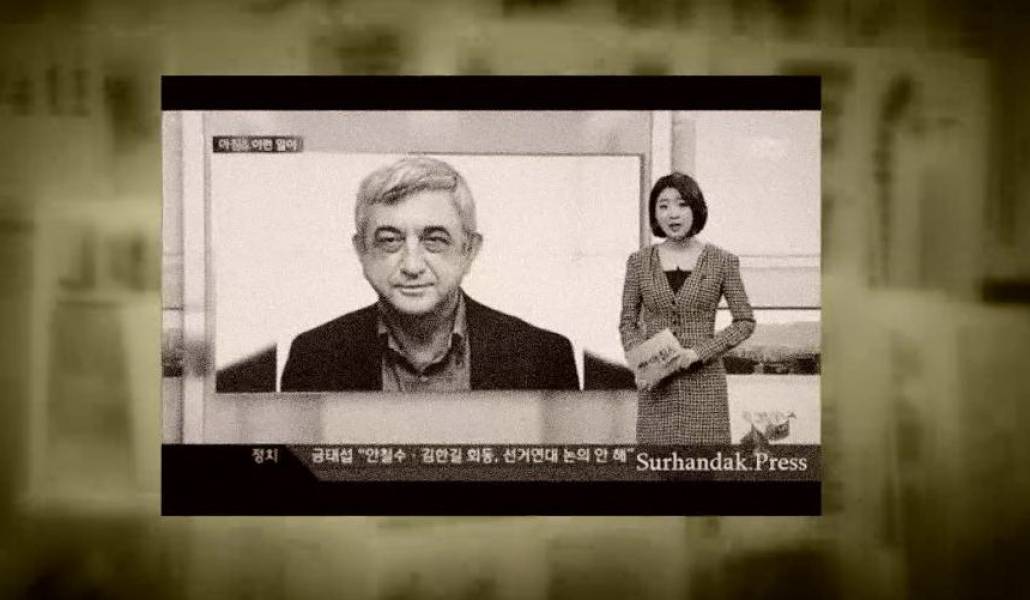
In February, 2014 the news that President Serzh Sargsyan took treatment course in South Korea for vaccination of stem cells shook the Armenian media outlets. After three years, starting from January 1, 2017, the Armenian media outlets have to be responsible for such and similar information containing personal data.
“Serzh Sargsyan is an official and is obliged to be accountable to the population of Armenia for each step,” Taguhi Tovmasyan, Editor-in-chief of “Zhoghovurd” daily, cannot understand how the existence of such a law is possible.
 There is no media in the whole world without bothering the authorities. In Armenia the government will defend itself from the media outlets, which bother them, with another law. In December, 2016 in one day the National Assembly removed the third provision of Article 1 from the law on “Protection of personal data”, according to which the restrictions of processing of personal data prescribed by this Law shall not cover the personal data being processed exclusively for journalism, literary and artistic purposes.
What is personal data? Lawyer Gevorg Hakobyan notes 6 kinds of personal data- ordinary, available for public, biometric, special, referring to the personal life etc. Only in the first two cases there isn’t necessity to get the person’s permission, whose data the journalist or any other citizen processes, “When we deal with biometric or special category, in these cases the processing isn’t allowed at all unless it is notified to the personal data protection agency. There is no need to receive agreement, but the law defines the necessity of notification.”
Arpine Hovhannisyan, former Minister of Justice, reminds that the 3rd provision of Article 1 entered into force with her initiative, when she was a lawmaker of the 5th convention NA. When the provision of that beneficial law for journalists was removed, she was already a Minister. She was personally explaining why journalists and writers shouldn’t have privileges while processing the personal data of other people,
“It is very widespread around the world, when people are paid for gathering personal data about other people and later that information is used for different purposes,” explains Arpine Hovhannisyan, who is already the Deputy Speaker of the NA.
There is no media in the whole world without bothering the authorities. In Armenia the government will defend itself from the media outlets, which bother them, with another law. In December, 2016 in one day the National Assembly removed the third provision of Article 1 from the law on “Protection of personal data”, according to which the restrictions of processing of personal data prescribed by this Law shall not cover the personal data being processed exclusively for journalism, literary and artistic purposes.
What is personal data? Lawyer Gevorg Hakobyan notes 6 kinds of personal data- ordinary, available for public, biometric, special, referring to the personal life etc. Only in the first two cases there isn’t necessity to get the person’s permission, whose data the journalist or any other citizen processes, “When we deal with biometric or special category, in these cases the processing isn’t allowed at all unless it is notified to the personal data protection agency. There is no need to receive agreement, but the law defines the necessity of notification.”
Arpine Hovhannisyan, former Minister of Justice, reminds that the 3rd provision of Article 1 entered into force with her initiative, when she was a lawmaker of the 5th convention NA. When the provision of that beneficial law for journalists was removed, she was already a Minister. She was personally explaining why journalists and writers shouldn’t have privileges while processing the personal data of other people,
“It is very widespread around the world, when people are paid for gathering personal data about other people and later that information is used for different purposes,” explains Arpine Hovhannisyan, who is already the Deputy Speaker of the NA.
 Liana Sayadyan, Deputy Editor of “Hetq” online media outlet, didn’t know about the elimination of the third provision of Article 1 of the law on “Protection of personal data” for two months. Then the editorial staff of “Hetq” received a letter from one of the heroes of one publication, who demanded to remove the personal data from an article published a few years ago. The editorial office didn’t have to do that, as the law didn’t have retrospective power, but the editorial did it. The journalist, though, understood that investigative journalism appeared in a trap,
“This change fully rules out investigative journalism in our country, as we deal with the personal data of officials, who are engaged in public activities; narrower circle of protection should operate in their case, but it restricts us and ties our hands.”
Lawyer Gevorg Hakobyan was among the first people, who learnt about the change in the law on “Protection of personal data”. He even cannot remember how he noticed that change, “It’s very interesting that there is no justification why it has been done.”
In fact, the change was carried out secretly. No journalist was aware that the parliament discussed such a change. Only the Government and the parliament were aware of it.
“No law can enter the parliament without discussing it with the interested parties. What’s more the journalistic organizations and the media outlets also must have been aware of the change,” says Ashot Melikyan, Chairman of Committee on Protection of Freedom of Expression.
Liana Sayadyan, Deputy Editor of “Hetq” online media outlet, didn’t know about the elimination of the third provision of Article 1 of the law on “Protection of personal data” for two months. Then the editorial staff of “Hetq” received a letter from one of the heroes of one publication, who demanded to remove the personal data from an article published a few years ago. The editorial office didn’t have to do that, as the law didn’t have retrospective power, but the editorial did it. The journalist, though, understood that investigative journalism appeared in a trap,
“This change fully rules out investigative journalism in our country, as we deal with the personal data of officials, who are engaged in public activities; narrower circle of protection should operate in their case, but it restricts us and ties our hands.”
Lawyer Gevorg Hakobyan was among the first people, who learnt about the change in the law on “Protection of personal data”. He even cannot remember how he noticed that change, “It’s very interesting that there is no justification why it has been done.”
In fact, the change was carried out secretly. No journalist was aware that the parliament discussed such a change. Only the Government and the parliament were aware of it.
“No law can enter the parliament without discussing it with the interested parties. What’s more the journalistic organizations and the media outlets also must have been aware of the change,” says Ashot Melikyan, Chairman of Committee on Protection of Freedom of Expression.
 Why weren’t the media outlets aware of this change even on the day when this change was being presented from the parliament’s rostrum?
Arpine Hovhannisyan explains, “The decision was made to regulate the issue in an urgent regime with the first and the second reading, taking into consideration also that fact that soon more serious changes will be initiated connected with the concept of journalism.”
The specialists, though, are shocked by the fact that the Agency of Protection of Personal Data of the Ministry of Justice also wasn’t aware of the change. “Why should it have been aware of the change?” expresses her surprise Deputy Speaker of the NA Arpine Hovhannisyan, who was still a Minister, when the law was changed, “The agency is my agency. What do you understand by saying ‘their agreement’? They are my subdivision.”
Why weren’t the media outlets aware of this change even on the day when this change was being presented from the parliament’s rostrum?
Arpine Hovhannisyan explains, “The decision was made to regulate the issue in an urgent regime with the first and the second reading, taking into consideration also that fact that soon more serious changes will be initiated connected with the concept of journalism.”
The specialists, though, are shocked by the fact that the Agency of Protection of Personal Data of the Ministry of Justice also wasn’t aware of the change. “Why should it have been aware of the change?” expresses her surprise Deputy Speaker of the NA Arpine Hovhannisyan, who was still a Minister, when the law was changed, “The agency is my agency. What do you understand by saying ‘their agreement’? They are my subdivision.”
 Shushan Doydoyan, Head of the RA MoJ Agency of Protection of Personal Data, told “A1+”, “When we are asked, we give our opinion, in this case our assessment, our opinion wasn’t asked. Consequently we didn’t express any opinion.”
The experts are convinced that this change is a bomb put under the media outlets; journalist will have to come to an agreement with their heroes before making reportages about them,
In this case, Ashot Melikyan, Chairman of the Committee on Protection of Freedom of Expression, notes, “In fact, especially the lawmakers, who are being criticized, will tell not to have any connection with their personal data and them in general.”
Shushan Doydoyan, Head of the RA MoJ Agency of Protection of Personal Data, told “A1+”, “When we are asked, we give our opinion, in this case our assessment, our opinion wasn’t asked. Consequently we didn’t express any opinion.”
The experts are convinced that this change is a bomb put under the media outlets; journalist will have to come to an agreement with their heroes before making reportages about them,
In this case, Ashot Melikyan, Chairman of the Committee on Protection of Freedom of Expression, notes, “In fact, especially the lawmakers, who are being criticized, will tell not to have any connection with their personal data and them in general.”
 In Armenia investigation appeared under the blow. The authorities can see no problem even here. If the investigation pursues public interest, if the investigator used sources available for the public or his or her hero isn’t against that socially unavailable sources are used, nothing threatens to the investigation. Liana Sayadyan is surprised- in that case what is the meaning of this change, if the journalist carries out the investigation according to the provisions of the law on mass media, where it is clearly mentioned that the journalist has no right to enter the personal territory of someone’s life.
According to the new law, the journalist, who publishes personal data, endangers not only himself or herself but also his or her computer.
“According to this change, the Agency on Protection of Personal Data has a power to go and clarify whether in this or that editorial office the personal data is protected appropriately. And it grants them an opportunity to log in journalists’ database and computers,” notes Liana Sayadyan.
Arpine Hovhannisyan doesn’t think that the journalists must be scared of this change. Soon they will also change the law on “Mass media”, which will clearly state who the journalist is, “In that case, when we clearly understand who the journalist is, what the aim of the journalism is and what it means to be engaged in journalism, this regulation will naturally, with all its privileges and restrictions, refer to the media outlets.”
Media outlets and all those, who will try to process personal data illegally, will face two months’ detention or up to AMD 500 000 fine. Even Arpine Hovhannisyan thinks that this amount of the fine is huge, “Anyway we should touch upon the size of accountability.”
The fact, that Armenia’s judicial system isn’t transparent, isn’t doubted, so the provision on detention can also become a tool in the hands of the authorities to take revenge on this or that media outlet.
“They aim at putting the media outlets in such a hard financial situation so that it be either closed or start admitting their rules and become a media outlet, which will remove any information with one phone call or ban any information,” says Taguhi Tovmasyan, Editor-in-chief of “Zhoghovurd” daily.
The law on “Protection of personal data” is already in force. Still this law hasn’t dealt a blow to any journalist or media outlet.
But the journalists are sure the answer to the question “Why was the third provision of Article 1 removed from the law” won’t be late.
In Armenia investigation appeared under the blow. The authorities can see no problem even here. If the investigation pursues public interest, if the investigator used sources available for the public or his or her hero isn’t against that socially unavailable sources are used, nothing threatens to the investigation. Liana Sayadyan is surprised- in that case what is the meaning of this change, if the journalist carries out the investigation according to the provisions of the law on mass media, where it is clearly mentioned that the journalist has no right to enter the personal territory of someone’s life.
According to the new law, the journalist, who publishes personal data, endangers not only himself or herself but also his or her computer.
“According to this change, the Agency on Protection of Personal Data has a power to go and clarify whether in this or that editorial office the personal data is protected appropriately. And it grants them an opportunity to log in journalists’ database and computers,” notes Liana Sayadyan.
Arpine Hovhannisyan doesn’t think that the journalists must be scared of this change. Soon they will also change the law on “Mass media”, which will clearly state who the journalist is, “In that case, when we clearly understand who the journalist is, what the aim of the journalism is and what it means to be engaged in journalism, this regulation will naturally, with all its privileges and restrictions, refer to the media outlets.”
Media outlets and all those, who will try to process personal data illegally, will face two months’ detention or up to AMD 500 000 fine. Even Arpine Hovhannisyan thinks that this amount of the fine is huge, “Anyway we should touch upon the size of accountability.”
The fact, that Armenia’s judicial system isn’t transparent, isn’t doubted, so the provision on detention can also become a tool in the hands of the authorities to take revenge on this or that media outlet.
“They aim at putting the media outlets in such a hard financial situation so that it be either closed or start admitting their rules and become a media outlet, which will remove any information with one phone call or ban any information,” says Taguhi Tovmasyan, Editor-in-chief of “Zhoghovurd” daily.
The law on “Protection of personal data” is already in force. Still this law hasn’t dealt a blow to any journalist or media outlet.
But the journalists are sure the answer to the question “Why was the third provision of Article 1 removed from the law” won’t be late.
